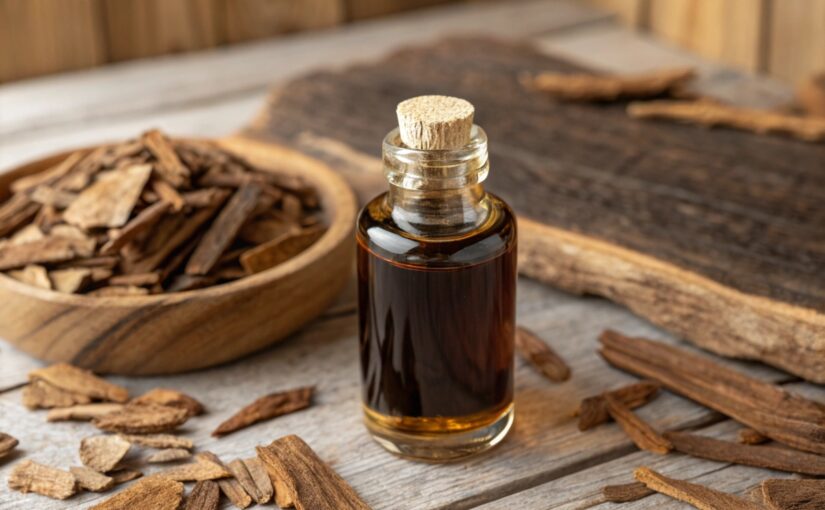Agarwood essential oil, derived from the precious resinous heartwood of Aquilaria agallocha, stands as one of the world’s most revered aromatic treasures. Known as oud, aloewood, eaglewood, or gaharu in different cultures, agarwood is intimately connected to ritual, wellness, and luxury, earning it grand titles such as “scent of nirvana” among Buddhists and “black gold” across the Middle East. Its significance stretches far beyond fragrance, weaving into traditions, medicine, and spiritual practices for millennia.
Botanical Profile and Extraction
Agarwood belongs to the Thymelaeaceae family and is native to the forests that stretch from India through Indonesia. Its essential oil is laboriously extracted by hydrodistillation or steam distillation from the dark, resin-rich heartwood. This resin is not found in every tree, only those infected by a specific fungus or naturally wounded produce the aromatic substance, a rare response that saturates the wood with complex, deeply evocative scent. Agarwood essential oil is distinguished by its warm, sweet, and smoky aroma, delicately layered with floral undertones and subtle hints of vanilla, honeyed tobacco, leather, and musk. Its deep brown color and rich chemical profile, including agarofuran, aromadendrene, calarene, guaiadiene, methoxy chromone, valencene, and valerianol, contribute to both its distinctive aroma and therapeutic properties.
History and Cultural Significance
“Agarwood has a warming property and spicy taste without toxin. It can be used to treat vomit, diarrhea, stomach pain, palsy. It can also bring calm to mind.”— Donguibogam (1613).
Throughout history, agarwood has been intimately linked with spirituality, medicine, and royalty. In ancient Hindu texts, it is listed among Krishna’s favored fragrances, while the Donguibogam, an influential Korean medical text from 1613, acknowledges its warming, calming, and medicinal properties. Agarwood smoke has perfumed temples and homes in India, China, Japan, and Tibet, with samurai once scenting their armor to invoke courage and good fortune.
Beyond ceremonial use, agarwood oil has become highly coveted for personal perfumes and skin tonics, with the most valuable oils originating from wild trees aged fifty years or more. Unfortunately, centuries of overharvesting have led to critical endangerment of Aquilaria species. Modern conservation efforts now rely on sustainably managed plantations that induce resin production in younger trees, usually around twenty years old, striking a balance between global demand and ecological responsibility.
Therapeutic Benefits
Agarwood essential oil is esteemed for a broad spectrum of therapeutic effects, supporting both physical and emotional health. On a physical level, it acts as a natural analgesic and antirheumatic, providing relief from arthritis, joint pain, and muscle swelling. Its antimicrobial and antifungal properties help combat various infections, while antioxidant components promote skin health and reduce the appearance of fine lines. As an antiasthmatic and carminative, agarwood assists in relieving asthma symptoms and digestive discomfort, and as a diuretic, it enhances circulation and reduces fluid retention.
The oil’s emotional impact is no less remarkable. Its rich aroma calms anxiety and stress with a gentle sedative effect, fostering relaxation and mental clarity. In Ayurveda, agarwood is valued as a tonic for enhancing mental strength and spiritual clarity. The oil’s profound grounding qualities make it an ideal tool for those seeking emotional balance and a deeper sense of tranquility. Early research hints at potential anticancer properties, but more studies are needed before these effects can be fully substantiated.
Aromatherapy and Everyday Applications
Agarwood essential oil brings serenity and spiritual focus into daily life through several aromatherapy methods. Diffusing three to five drops in a water-based diffuser envelops any space in meditative calmness. For immediate stress relief or spiritual grounding, inhaling one or two drops placed in the palms is effective and safe. Incorporating agarwood into massage oils, typically ten drops blended with thirty milliliters of jojoba oil, offers both muscular and skin benefits, while diluted topical application to pulse points enhances emotional stability and skin texture.
The spiritual uses are equally compelling, with agarwood long cherished as a means to facilitate meditation, prayer, and sacred rituals. Its presence helps release anxiety, nurture inner peace, and guide practitioners toward higher states of consciousness. In Ayurveda, it is a respected mind-strengthener, and its companionship with oils such as bergamot, frankincense, jasmine, lemon, lime, myrrh, neroli, rose, patchouli, palo santo, vetiver, and ylang-ylang unlocks an aromatic synergy that amplifies holistic well-being.
Safety and Sustainability
While agarwood essential oil is generally safe used properly, some cautions are warranted. Its sedative qualities may induce drowsiness, so it should be avoided before activities requiring alertness such as driving. Always dilute agarwood oil with a carrier oil prior to topical use to prevent skin irritation. Most crucially, mindful consumption of agarwood ensures that pressure on endangered wild species is relieved. Consumers are encouraged to seek out sustainably sourced oil, supporting ethical cultivation and conservation.
Agarwood essential oil is more than an exquisite fragrance; it is a bridge between the physical and spiritual realms. With its remarkable therapeutic benefits, evocative aroma, and sacred history, agarwood continues to inspire healing, tranquility, and inner peace. Choosing ethically sourced oil not only preserves the future of this ancient treasure but also honors centuries of tradition and the profound sense of serenity it brings to all who experience its scent.
If your heart finds joy and inspiration here, consider supporting the work that keeps these stories blooming. Your donation, no matter the size, helps sustain authentic research, creative writing, and the spirit of sharing that connects us all.
